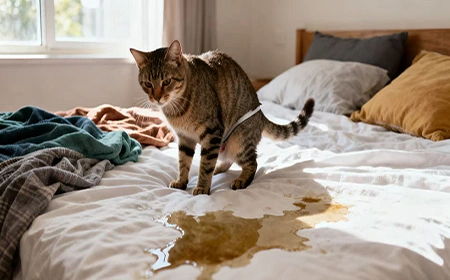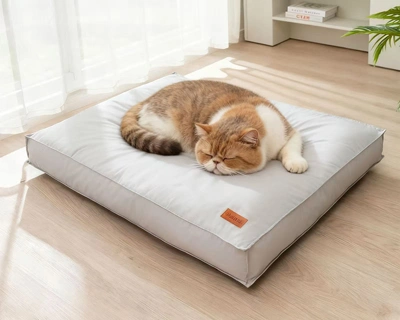Cart
Your shopping cart doesn't have any products yet!
If you’ve ever woken up to the smell of cat urine on your bed, you know the frustration. A cat peeing outside the litter box isn’t just messy—it’s a sign something might be off, and cleaning your mattress repeatedly can feel never-ending. The good news? With the right strategies and tools, you can put an end to this habit and protect your bed (and sanity) for good.
Before you fix the behavior, you need to understand the root cause. Cats don’t pee on beds out of “spite”—usually, it’s a response to stress, health issues, or litter box problems. Here are the most common reasons:
Health troubles: Urinary tract infections (UTIs), kidney disease, or diabetes can make it hard for cats to hold their bladder. If your cat’s peeing suddenly, a vet visit is non-negotiable—this could be a medical emergency.
Stress or anxiety: Changes like a new pet, moving, or even rearranging furniture can stress cats out. They may pee on your bed (a place that smells like you) to feel safe.
Litter box issues: Cats are picky! If the box is too dirty, too small, in a noisy spot, or has a litter they hate (scented litters are a common culprit), they’ll avoid it.
Aging or incontinence: Senior cats often struggle with bladder control. This isn’t a behavior problem—it’s a need for extra protection.

Once you’ve ruled out health issues (again, see a vet first), try these fixes to redirect your cat:
Upgrade the litter box setup:
Have one box per cat, plus an extra (rule of thumb: n+1 boxes).
Scoop daily, deep-clean weekly, and use unscented, clumping litter.
Place boxes in quiet, low-traffic areas—avoid bathrooms next to noisy washers or near their food.
Make your bed “unappealing” (temporarily):
Use a waterproof mattress protector (we’ll get to a better solution soon!) to block moisture.
Try double-sided tape or aluminum foil on the bed—most cats hate the texture.
Keep your bedroom door closed when you’re not home, so your cat can’t access the bed.
Reduce stress:
Add vertical space (cat trees) or hiding spots (cardboard boxes) for your cat to feel safe.
Stick to a routine—feed, play, and clean the litter box at the same times daily.
Use pheromone diffusers (like Feliway) to calm anxious cats.
Reward good behavior:
Praise or give treats when your cat uses the litter box.
Play with your cat near the litter box to create positive associations.
If your cat has ongoing incontinence (common in seniors) or just can’t kick the bed-peeing habit yet, you need a product that protects bothyour mattress and your cat’s comfort. Enter: Waterproof & Washable Pet Beds for Incontinence – All-Year Comfort for Cats.

Waterproof & Washable Pet Beds for Incontinence
This isn’t just a regular pet bed—it’s designed to solve the exact problem you’re facing. Here’s why it’s a game-changer (simplified for what matters most):
Dual waterproof protection: An outer waterproof memory cloth blocks spills instantly, plus a built-in inner liner keeps the bed’s filling 100% dry—no more soaked beds or smelly mattresses.
Effortless cleaning: Wipe up small accidents with a damp cloth, or remove the entire cover and throw it in the washing machine—no scrubbing, no hassle.
Odor & bacteria-free: Seals out moisture to stop odor-causing bacteria and mildew, so your home (and the bed) stays fresh, even after accidents.
Comfort your cat will love: 4.33-inch thick, high-density padding supports joints (perfect for seniors!) and feels soft—your cat will choose this bed over yours in no time.
Spacious & durable: Fits small to medium cats (and dogs!) with room to stretch, and built to last through repeated washes and daily use.
Stopping a cat from peeing on the bed takes patience, but it’s totally doable. Start with a vet visit, fix the litter box, and reduce stress—and for extra protection (especially for incontinent cats), invest in a waterproof, washable pet bedthat keeps both you and your cat happy. With the right tools, you’ll say goodbye to midnight mattress cleanups and hello to worry-free rest.